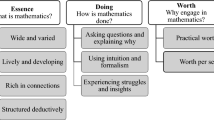Abstract
This study investigates the different ways by which secondary school mathematics teachers view how advanced mathematics studies are relevant to expertise in classroom instruction. Data sources for this study included position papers and written notes from a group interview of 15 Israeli teachers who studied in a special master’s program, of which advanced mathematics courses comprise a sizeable share. Data analysis was iterative and comparative, aiming at identifying and characterizing teachers’ different perspectives. Overall, all participating teachers thought that the advanced mathematics studies in the program were relevant to their teaching of secondary school mathematics. Moreover, teachers specifically mentioned the importance of studying contemporary mathematics from research mathematicians. All teachers pointed out at least one specific feature that they viewed as relevant to their work: advanced mathematics courses (1) as a resource for teaching secondary school mathematics, (2) for improving understanding about what mathematics is, and (3) for reminding teachers what learning mathematics feels like.
Similar content being viewed by others
References
Ball, D. L. (1990). Prospective elementary and secondary teachers’ understanding of division. Journal for Research in Mathematics Education, 21(2), 132–144.
Ball, D. L. (1991). Research on teaching mathematics: Making subject matter knowledge part of the equation. In J. Brophy (Ed.), Advances in research on teaching (Vol. 2, pp. 1–48). Greenwich, CT: JAI Press.
Ball, D. L., Thames, M. H., & Phelps, G. (2008). Content knowledge for teaching: What makes it special? Journal of Teacher Education, 59(5), 389–407.
Borko, H. (2004). Professional development and teacher learning: Mapping the terrain. Educational Researcher, 33(8), 3–15.
Chi, M. T. H. (2011). Theoretical perspectives, methodological approaches, and trends in the study of expertise. In Y. Li & G. Kaiser (Eds.), Expertise in mathematics instruction: An international perspective (pp. 17–39). New York: Springer.
Davis, B. (2008). Is 1 a prime number? Developing teacher knowledge through concept study. Mathematics Teaching in the Middle School (NCTM), 14(2), 86–91.
Davis, J. D. (2009). Understanding the influence of two mathematics textbooks on prospective secondary teachers’ knowledge. Journal of Mathematics Teacher Education, 12(5), 365–389.
Davis, B., & Simmt, E. (2006). Mathematics-for-teaching: An ongoing investigation of the mathematics that teachers (need to) know. Educational Studies in Mathematics, 61, 293–319.
Even, R. (1990). Subject matter knowledge for teaching and the case of functions. Educational Studies in Mathematics, 21, 521–544.
Even, R. (1993). Subject-matter knowledge and pedagogical content knowledge: Prospective secondary teachers and the function concept. Journal for Research in Mathematics Education, 24(2), 94–116.
Even, R. (1999). The development of teacher-leaders and in-service teacher educators. Journal for Mathematics Teacher Education, 2, 3–24.
Even, R. (2005). Integrating knowledge and practice at MANOR in the development of providers of professional development for teachers. Journal of Mathematics Teacher Education, 8(4), 343–357.
Even, R., & Ball, D. L. (Eds.). (2009). The professional education and development of teachers of mathematics—the 15th ICMI Study. New York, NY: Springer.
Knuth, E. J. (2002). Secondary school mathematics teachers’ conceptions of proof. Journal for Research in Mathematics Education, 33(5), 379–405.
Kvatinsky, T., & Even, R. (2002). Framework for teacher knowledge and understanding about probability. In B. Phillips (Ed.), Proceedings of the sixth international conference on teaching statistics (CD). Cape Town: International Statistical Institute.
Rowland, T., Huckstep, P., & Thwaites, A. (2005). Elementary teachers’ mathematics subject knowledge: The knowledge quartet and the case of Naomi. Journal of Mathematics Teacher Education, 8, 255–281.
Schwab, J. (1978). Education and the structure of the disciplines. In I. Westbury & N. Wilkof (Eds.), Science, curriculum and liberal education: Selected essays (pp. 229–272). Chicago: University of Chicago Press (original work published 1961).
Shulman, L. S. (1986). Those who understand: Knowledge growth in teaching. Educational Researcher, 15(2), 4–14.
Simmt, E. (2011). Teacher expertise explored as mathematics for teaching. In Y. Li & G. Kaiser (Eds.), Expertise in mathematics instruction: An international perspective (pp. 151–164). New York: Springer.
Tatto, M. T., Lerman, S., & Novotna, J. (2009). Overview of teacher education systems around the world. In R. Even & D. L. Ball (Eds.), The professional education and development of teachers of mathematics: The 15th ICMI Study (pp. 15–24). New York: Springer.
Tatto, M. T., Lerman, S., & Novotna, J. (2010). The organization of the mathematics preparation and development of teachers: a report from the ICMI Study 15. Journal of Mathematics Teacher Education, 13, 313–324.
Wilson, M. (1994). One preservice secondary teacher’s understanding of function: The impact of a course integrating mathematical content and pedagogy. Journal for Research in Mathematics Education, 25, 346–370.
Wu, H. (2011). The mis-education of mathematics teachers. Notices of the AMS, 58(3), 372–384.
Zaslavsky, O., Chapman, O., & Leikin, R. (2003). Professional development in mathematics education: Trends and tasks. In A. J. Bishop, M. A. Clements, C. Keitel, J. Kilpatrick, & F. K. S. Leung (Eds.), Second international handbook of mathematics education (pp. 877–915). Dordrecht: Kluwer.
Zazkis, R., & Leikin, R. (2010). Advanced mathematical knowledge in teaching practice: Perceptions of secondary mathematics teachers. Mathematical Thinking and Learning, 12(4), 263–281.
Author information
Authors and Affiliations
Corresponding author
Rights and permissions
About this article
Cite this article
Even, R. The relevance of advanced mathematics studies to expertise in secondary school mathematics teaching: practitioners’ views. ZDM Mathematics Education 43, 941–950 (2011). https://doi.org/10.1007/s11858-011-0346-1
Accepted:
Published:
Issue Date:
DOI: https://doi.org/10.1007/s11858-011-0346-1




